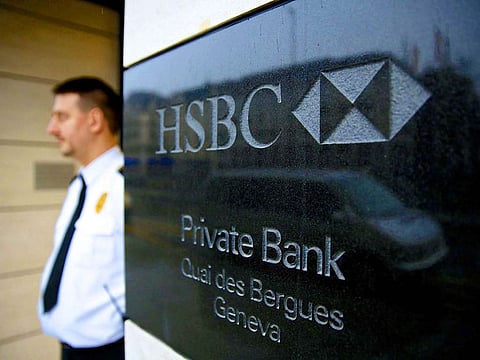HSBC finally makes up its mind about the CEO
It was becoming blindingly obvious there is no one else other than Noel Quinn

Noel Quinn’s appointment as CEO of HSBC Holdings Plc was all but inevitable. Europe’s biggest bank did itself no favours by taking seven months to make the decision. It’s good that it has acted at last: No lender the size of HSBC should be comfortable heading into a financial crisis with a caretaker CEO.
HSBC approached at least three outsiders for the CEO role after ousting John Flint in August, leaving Quinn in charge on an interim basis. Citigroup Inc. veterans Stephen Bird and James Forese, and UniCredit SpA’s Jean Pierre Mustier all ruled themselves out of contention. Flint was axed after only 18 months in the role, having failed to satisfy Chairman Mark Tucker that he was doing enough to revive growth at the London-based and Asia-focused bank.
The frustrated CEO search led to the bizarre situation of having an interim chief present the bank’s most radical overhaul in years, a plan that includes as many as 35,000 job cuts and a $100 billion reduction in gross assets. No outsider would be scrambling to lead the bank after such big decisions had already been taken, leaving Quinn the likely pick.
Exactly one month later, HSBC has come to the same conclusion.
Steady hand at the till
As a 33-year veteran of HSBC, Quinn represents continuity and stability. Both are welcome. The landscape looks vastly different than when Tucker became the first outsider to helm the bank on October 1, 2018.
Former CEO Stuart Gulliver, Flint’s predecessor, had already started the tough work of trimming of one of the world’s most bloated banks. HSBC had cut tens of thousands of jobs, exited at least 80 businesses, and was back in analysts’ good books. Interest rates were rising in Hong Kong, its single largest market, as the US Federal Reserve moved to normalise policy.
Two-and-a-half years later, the coronavirus pandemic is making a mockery of forecasts of how the world would look. Interest rates are back at zero, credit markets are tightening and dollar funding is freezing up in an uncomfortable echo of the 2008 credit crisis. The Fed already began cutting borrowing cuts late last year as the US economy weakened, hitting net interest margins of banks across the world.
Experience to fall back on
If the financial turmoil unleashed by the virus proves as severe as the crisis of 12 years ago, then experience will be at a premium. Quinn has the advantage of having been with HSBC through that period.
Tucker’s banking experience, by contrast, is limited to a couple of years at HBOS Plc in the early 2000s, a non-executive role at the Bank of England and a period on the board of Goldman Sachs Group Inc.
With the global economy heading into recession, no bank will be left unscathed. HSBC said last month it could see an additional $600 million losses if the virus outbreak extends to the second half of the year. It is at least in a stronger position to ride out the crunch than many banks. HSBC is liquid, with plenty of deposits, especially in its Hong Kong.
Its mortgage loan book in Hong Kong looks secure, with the city’s real estate market having proved resilient so far. And its size and geographic spread ensure access to dollar funding.
Amid these challenging conditions, Quinn’s appointment has come in less than ideal fashion, with his extended probation making clear that the board harboured doubts about his suitability. The next few months will be a test of his safe hands.
He won’t be the only HSBC leader to be tested. After such a clumsy search for its next CEO, investors may feel that Tucker deserves scrutiny, too.







